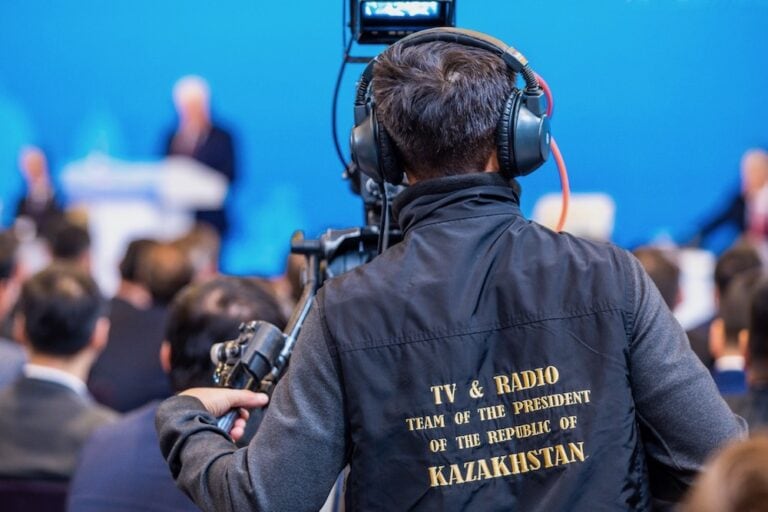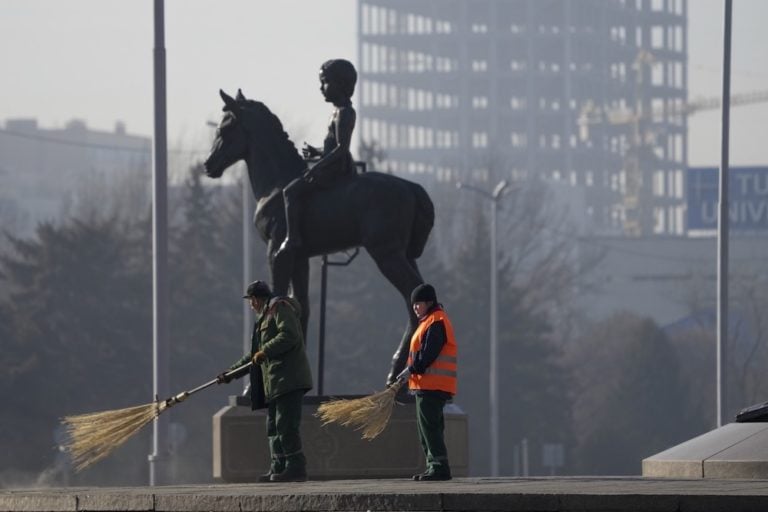(RSF/IFEX) – In a 20 November 2001 letter to Minister of the Interior Bolat Iskanov, RSF asked the authorities in Kazakhstan to order the withdrawal of their troops from the studios of the independent television station KTK and respect the station’s independence. “Caught red-handed in the act of censoring, the authorities in Kazakhstan are mistaken […]
(RSF/IFEX) – In a 20 November 2001 letter to Minister of the Interior Bolat Iskanov, RSF asked the authorities in Kazakhstan to order the withdrawal of their troops from the studios of the independent television station KTK and respect the station’s independence.
“Caught red-handed in the act of censoring, the authorities in Kazakhstan are mistaken in their belief that their attacks against press freedom will drown in the current context of widespread reinforced security,” stated Robert Ménard, the organisation’s secretary-general. “We urge you to put an immediate end to this unacceptable armed occupation,” added Ménard.
According to information collected by RSF, on 16 November, armed troops from the Ministry of the Interior raided the building that houses the independent television station KTK in Almaty (formerly Alma Ata), temporarily suspending broadcasts. The station broadcast images of soldiers holding automatic weapons taking positions in its studios. The troops were reportedly brought in by order of Kazakhstan’s Security Council, on the pretext that in the context of the conflict in Afghanistan, “all of the Republic of Kazakhstan’s strategic installations must be guarded by the Ministry of the Interior’s troops.” According to a station manager, there is an urgent need for a stop to the pressure that is being brought to bear against independent journalists, including phone tapping and the surveillance of mail.
RSF recalls that since President Nursultan Nazarbayev’s reelection in January 1999, during a poll that was criticized by the Organization for Security and Cooperation in Europe (OSCE), pressure on independent and opposition media has increased. On 31 March 2000, Tatiana Deltsova, a journalist from the private Almaty television station Channel 31, was dismissed. She had earlier made mention of the intimidation against a number of opposition leaders on her programme “Informbureau” (see IFEX alert of 24 April 2000). In January, two journalists working for the same programme were dismissed following pressure by the authorities, according to station managers. On 25 January, a tribunal in the Ust-Kamenogorsk region (in the country’s east) suspended the newspaper “HBC-Press” after accusing it of “inciting rebellion.” On 30 November 1999, the authorities in Termirtau (in the country’s north-east) suspended the programmes of local television stations TV 29, Ispat Sfera and 43 Kanal, and those of the private radio station Radio 102, on the pretext that they were operating without a licence. In a 24 April 2000 televised speech, Nazarbayev stated that the state “will not tolerate divergences, wherever they may originate,” particularly “excesses in speech or the incorrect interpretation of freedom of expression and press freedom.” He also threatened to close media outlets that “oppose the system and blacken this state in the eyes of the world” (see IFEX alerts of 26 April 2000).


